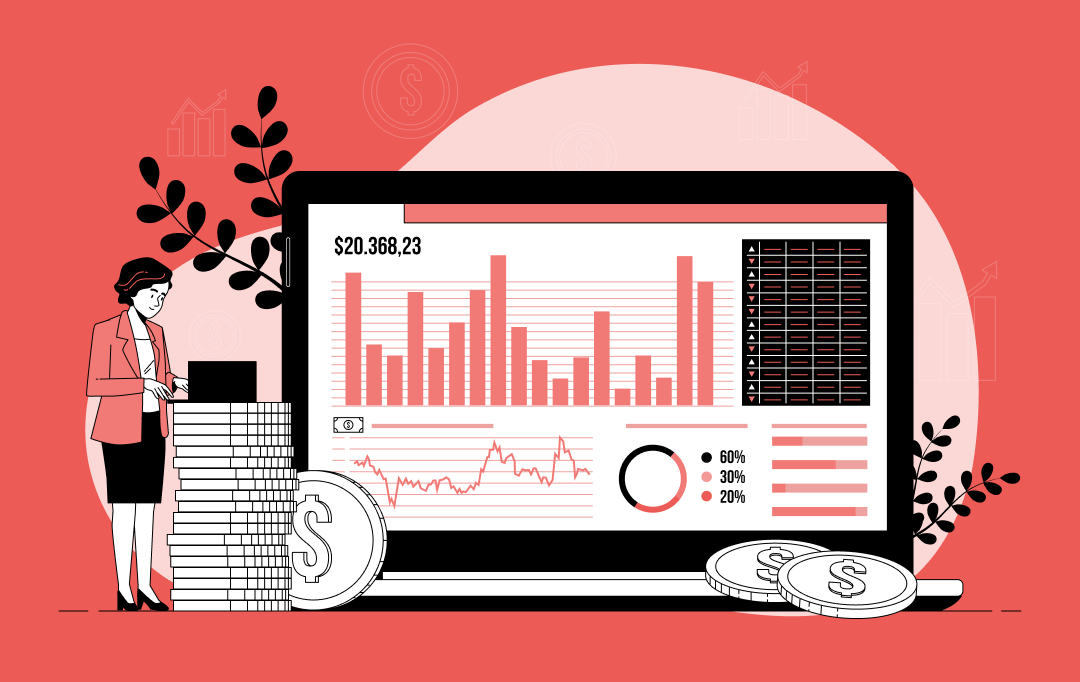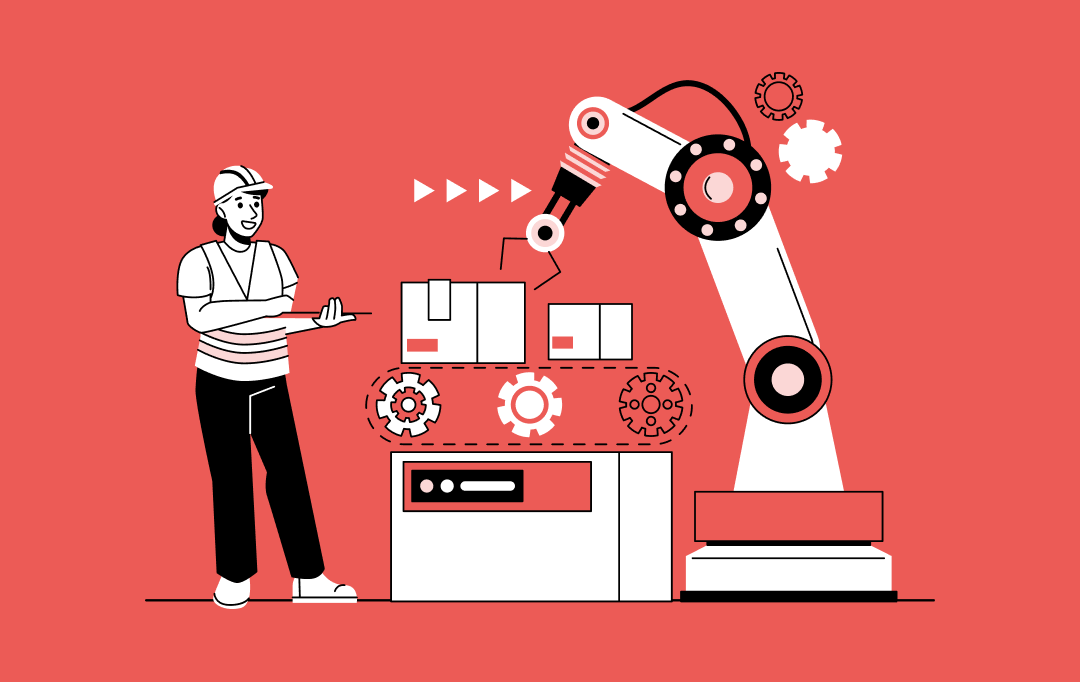- Predictive Analytics in Business: Why Should You Invest?
- Making Data-Driven Decisions
- Improved Understanding of Consumer
- Risk Reduction
- Better Planning and Forecasting
- Predictive Analytics Business Cases: Industry-Wise Examples
- Finance
- Retail
- Healthcare
- Transportation
- Energy
- The Business Benefits of Embracing Predictive Analytics
- Operational Efficiency
- Customer Churn Forecast
- Lead Segmentation
- Campaign Optimization
- Risk Management
- Fraud Detection
- Customer Relationship Management (CRM)
- Predictive Analytics Implementation Pitfalls or Challenges
- Lack of Domain Expertise
- Insufficient Data Quantity
- Poor Data Quality
- Bias and Discrimination
- Lack of Continuous Monitoring
- Changing Data Patterns
- Kickstart the Predictive Analytics Journey for Your Business With Appinventiv
- FAQs
As a business, you have access to a wealth of data that can help you make informed decisions. With predictive analytics in business, you can analyze past data to create models for making accurate projections about future outcomes. This will allow you to learn from your past successes and failures and make the necessary changes to ensure your business thrives.
Predictive analytics for business has now become a potent instrument for transforming decision-making procedures and propelling strategic progress. It enables businesses to gain useful insights and make precise predictions about future events and outcomes by utilizing historical and real-time data. The global predictive analytics market is expected to reach the value of $41.52 billion by 2028 owing to the growing demand for predictive analytics solutions for business.

In this blog, we will discuss why businesses should invest in predictive analytics, some of the top examples and applications of predictive analytics in business, pitfalls, and tools. Let’s delve deeper.
Predictive Analytics in Business: Why Should You Invest?
The benefits of investing in predictive analytics for business can have a big impact on the success of any organization. The following are some benefits of investing in predictive analytics solutions for business:

Making Data-Driven Decisions
Predictive analytics uses real-time and historical data to produce insights and forecasts about the future. Organizations can make well-informed decisions based on quantitative analysis by adopting data-driven decision-making rather than depending simply on intuition or guesswork.
Improved Understanding of Consumer
Predictive analytics can examine customer information, including purchase history, browsing habits, and demographics, to create a thorough picture of the customer’s preferences and behaviors. Businesses may personalize marketing efforts, enhance client segmentation, and send targeted offers, which raises customer satisfaction, and boosts customer retention and sales.
Risk Reduction
Leveraging predictive analytics for business strategy can help you spot possible risks and dangers in various business fields, such as fraud identification, credit risk evaluation, supply chain interruptions, and cybersecurity. Businesses can lessen financial losses, avoid fraud, safeguard critical data, and preserve operational continuity by proactively recognizing and reducing risks with predictive analytics.
Better Planning and Forecasting
Predictive analytics enables firms to more accurately predict future trends, demand, and market behavior. Organizations are able to allocate resources, optimize inventory levels, and match production schedules with the data.
[Also Read: Predictive Analytics in HR – Benefits, Applications, Challenges and Real Examples]
It’s crucial to remember that effective predictive analytics implementation calls for the right data infrastructure and qualified experts with the right knowledge and experience. This takes us to our next point of discussion, the use of predictive analytics in business from different industry verticals.
Predictive Analytics Business Cases: Industry-Wise Examples
Multiple industries have realized the potential and importance of predictive analytics in business, which has helped them improve their business processes. Here are some of the top predictive analytics business examples:

Finance
Predictive analytics is a powerful tool that can help financial organizations detect fraudulent transactions in real-time. By analyzing historical transaction data, these organizations can create models that spot trends of fraudulent conduct and prevent future incidents. With fraud detection, credit scoring, and investment forecasts all relying on predictive analytics, it’s clear that this technology is a must-have for any financial institution looking to stay ahead of the game.
Retail
Predictive analytics is a powerful tool that can help retail businesses optimize their operations and increase profits. By forecasting customer demand, merchants can ensure that they always have the right products in stock while also reducing waste and minimizing costs. With customized marketing campaigns, retail businesses can target their advertising efforts to the customers most likely to make a purchase, improving their return on investment.
(Also read: 10 Ways Retail Predictive Analytics Can Drive Growth in Business)
Healthcare
By analyzing patient data, hospitals can predict patient outcomes through predictive analytics, identify those who are at risk of developing specific ailments, and allocate resources more effectively. For example, hospitals can use predictive models to forecast the likelihood of readmission within a specific time frame. This can help hospitals reduce costs and improve patient outcomes. Read this blog to learn how data analytics in healthcare is helping in cost reduction.
Transportation
Route planning, maintenance needs, and fleet management can all be improved with predictive analytics. To optimize delivery routes and anticipate delays, logistics organizations can leverage predictive analytics solutions for businesses to collect past transportation data, weather data, and other variables.
Energy
Energy firms can reduce energy waste by demand forecasting using historical consumption trends and adjusting production accordingly. Predictive analytics solutions can pre-analyze equipment faults and optimize energy usage. By harnessing the power of data, companies can save money, reduce downtime, and improve overall efficiency.
These were some of the top applications of predictive analytics in business, explained industry-wise. Let’s now move on to discuss predictive analytics for business advantages.
The Business Benefits of Embracing Predictive Analytics
Predictive analytics offers businesses multiple benefits, which overall help organizations optimize their processes and drive business growth. Let’s have a closer look at the benefits of embracing predictive analytics for business strategy.

Operational Efficiency
There are several internal touchpoints where predictive data analytics can be integrated for smoother day-to-day operations. Managers can devote resources to new initiatives based on near-perfect estimates of when ongoing work will be completed.
Similarly, firms might request that HR departments hire more employees if they expect increased workloads in the near future. For budgeting, demand and supply management, performance incentivization, and planning the business roadmap, accurate projections are crucial in sales.
Customer Churn Forecast
Making a churn forecast entails detecting the signals that precede your customers’ cancellation requests and evaluating the likelihood in each case.
You can use predictive models to compare data like customer service quality, customer satisfaction, and churn rate to see which aspects influence cancellation.
The idea is to figure out what’s causing the customer’s loss and then reverse the process.
Lead Segmentation
Lead segmentation techniques can also benefit from predictive analytics.
After all, mapping the profile of these potential clients in order to deliver personalized content and design-proof nutrition campaigns is one of marketing’s most difficult tasks.
You can create segmented groups based on extensive research using data and machine learning, forecasting which leads require the smallest details. You can know the estimated time, cost, and deliverables of an ML project.
Campaign Optimization
Your whole marketing campaign history can be used to forecast better future results.
Simply utilize predictive analytics project management to determine the optimal channels for each piece of content, the most effective language for each target demographic, and other factors influencing consumer acceptability.
As a result, when interacting and winning over your audience, you shoot squarely at the objective.
Risk Management
Another area that benefits directly from predictive analysis is risk management.
Isn’t it much easier to make judgments when you have a clear picture of the dangers and opportunities ahead?
Consequently, whether analyzing a customer’s credit risk or the potential implications of investment, anticipating the probability of profit or loss is the major differentiator of modern data analysis.
Fraud Detection
Companies can also use analytical methods to detect fraud patterns and avoid security breaches.
With the increased focus on cybersecurity, an increasing number of businesses are concerned about addressing vulnerabilities and detecting anomalies in a timely manner to avoid damage.
Predictive models make it much easier to spot dangers and avoid scams in real time.
Customer Relationship Management (CRM)
Predictive models can be used in CRM strategies to understand clients at every stage of their life cycle and purchasing journey.
There is plenty of data to build multivariate models and assess the widest range of possible links between behaviors, profiles, purchase histories, interactions, and consumer perceptions in this example.
You can revolutionize your consumer relationship with customized content, promotions, and offers if you have this key information.
Now that you know predictive analytics advantages, you should also be aware of the potential challenges or pitfalls associated with the same.
Predictive Analytics Implementation Pitfalls or Challenges
Although predictive analytics has a lot of potential, there are a few pitfalls that businesses should be wary of. The following are some of the main obstacles that businesses often face while implementing predictive analytics:
Lack of Domain Expertise
For predictive analytics to be successful, it is essential to understand the context and subtleties of the business domain. It becomes difficult to evaluate the results, validate the models, and make wise judgments based on the forecasts without enough domain knowledge.
Insufficient Data Quantity
In order to recognize significant patterns and produce reliable predictions, predictive models need a sufficient amount of data. Predictions may be inaccurate if the dataset is too limited or lacks diversity since it may not accurately reflect the complexity of the issue.
Poor Data Quality
The accuracy and quality of the data are crucial to predictive models. The accuracy and dependability of forecasts can be greatly impacted if the data utilized for analysis is lacking, inconsistent, or erroneous.
Bias and Discrimination
Discriminatory outcomes might result from predictive models unintentionally perpetuating biases found in the training set. Unfair decisions may result from biased data or model design, especially in fields like recruiting, lending, or criminal justice.
Lack of Continuous Monitoring
To ensure that predictive models work consistently across time, continuous monitoring is necessary. Regular model monitoring can prevent accuracy degradation, particularly if the underlying data or business context changes.
Changing Data Patterns
Predictive models are constructed from historical data, making the assumption that the patterns seen in the past will continue to exist in the future. However, the model could become out of date or provide incorrect predictions if the underlying patterns change.
Organizations should invest in strong data management procedures and consult subject matter experts or predictive analytics service providers like Appinventiv during the implementation process. A predictive analytics company like ours ensures routine reviews and updates and makes sure the predictive analytics process is transparent and equitable in order to avoid falling victim to these problems.
Let’s now have a closer look at the top predictive analytics tools. These tools are a must-have for any business looking to stay ahead of the competition. By analyzing data and patterns, these tools can help businesses make informed decisions and predict future trends.
Kickstart the Predictive Analytics Journey for Your Business With Appinventiv
Because of the enormous economic value it provides, predictive analytics models will play an increasingly important role in company processes in the future. While these models aren’t flawless, the benefit they provide to both SMEs and large scale organizations is enormous. Organizations can use predictive data analytics to take pre-emptive action in a range of areas.
To get started with your learning journey of predictive analysis and establish your product and business successfully, consult and hire an experienced software development company like Appinventiv.
With our premium data analytics solutions, you can unlock valuable insights and make data-driven decisions for your business. Our team of experts brings their years of experience to the table and crafts tailored solutions that precisely cater to your specific requirements, thereby ensuring optimal results. Contact us today to learn more about our services and how we can help your business grow.
FAQs
Q. What is predictive analytics in business?
A. Predictive analytics is the use of various statistical techniques, including automated machine learning algorithms, deep learning, data mining, and artificial intelligence (AI), to create predictive models that extract data from datasets, identify patterns, and provide a predictive score for a range of organizational outcomes.
Q. What are examples of predictive analytics in business?
A. Predictive analytics was formerly thought to be a specialized tool only available to a select few, but it is now being used by an increasing number of businesses on a daily basis. Here are a few of the industry examples where predictive analytics is used.
- Sports
- Retail
- Health
- Weather
- Financial Modeling
- Insurance and Risk Assessment
- Social Media Analysis
- Supply Chain Management
Q. How predictive analytics helps business?
A. Businesses can benefit significantly from predictive analytics:
- It forecasts future events by examining historical data and using statistical models, allowing companies to make wise decisions.
- It supports cost-effective inventory management, precise demand forecasting, and cost reduction.
- Additionally, predictive analytics improves customer insights, enabling targeted marketing strategies and enhancing client retention.
- It aids in the detection of potential fraud or danger, enabling the adoption of preventative actions.
- It aids in streamlining operations, boosting effectiveness, and locating potential process optimization areas.


- In just 2 mins you will get a response
- Your idea is 100% protected by our Non Disclosure Agreement.

Unleashing the Role of Data Analytics in Driving Smarter Banking Decisions
The use of data analytics in banking is transforming how this data is interpreted and applied. Banks are using this data to make decisions that matter—fraud checks, loan approvals, or marketing campaigns. The focus has shifted: from storing data to using it smartly, and from pushing products to understanding people—being customer-centric. This shift is also…

10 Use Cases and Examples of How Pharmacy Data Analytics is Transforming Operations and CX
Data has become the currency of modern business, and the pharmacy sector is no exception. From inventory optimization to regulatory compliance, pharmacies today face many challenges that demand precision and agility. Well, pharma data analytics is solving all these conundrums as the main lead, a transformative approach that now empowers businesses to get actionable insights…

10 Use Cases and Benefits of Predictive Analytics in Manufacturing
Are you trying to stay in today’s manufacturing game with that old-school data analytics approach? Not gonna happen, buddy! Think about that old-school grind: manufacturing plant techies had to hustle around, scribbling notes and logging maintenance records by hand. All that manual intervention and hassle led to nothing more than messy data and bad calls.…


















